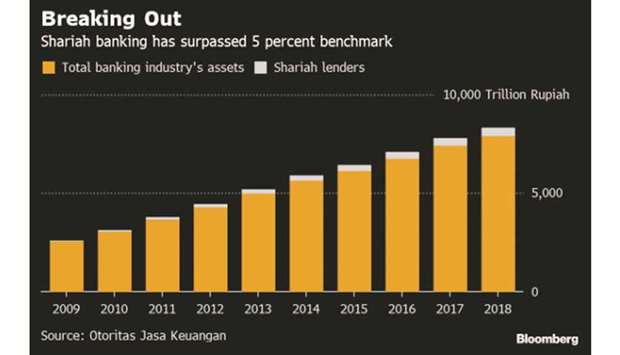With demand for financial products conforming to Islamic principles soaring, Shariah banking in Indonesia is poised for a phase of rapid growth, according to the nation’s largest Islamic bank.
Shariah banking assets have broken out of the “5% market trap” that it was in for a long time thanks to a wave of halal lifestyle sweeping the world’s largest Muslim-majority country, said Toni Eko Boy Subari, president director of PT Bank Syariah Mandiri. The lender expects its financing to expand 11 to 12% this year, a second straight year of double-digit growth, he said.
Even with Muslims making up almost 90% of Indonesia’s 265mn population, Shariah financial products have struggled to gain much ground as conventional banks dominated the financial industry. That may be about to change as the government and central bank drive the promotion of Shariah banking and other financial instruments among the followers of Islam.
“Previously not many people knew what Islamic banking is, what the products are and what they can offer,’’ said Subari, whose bank is the country’s largest Islamic lender with more than 20% market share. “Various promotional Islamic activities have worked in our favour.”
Indonesia’s 182 Islamic banks and 20 Shariah business units had a combined 451.2tn rupiah ($32bn) of assets at the end of November, or about 5.7% of the total of the banking industry, data from the Financial Services Authority show. That’s only a fraction of the $2.1tn in Islamic finance worldwide in 2017.
Indonesia plans to make halal certification mandatory for all consumer products from October this year as it seeks a slice of the global halal economy that has tripled to $6.4tn in six years. The country’s halal food spending alone was $170bn in 2017, the highest among the top consuming nations including Turkey, Pakistan and Egypt, according to the State of the Global Islamic Economy Report.
As more Indonesians become aware of the halal products, they turn to Islamic banks to deposit their funds because of increased consciousness of the religious doctrine underpinning the two, Subari said in an interview.
Syariah Mandiri’s customer deposits rose by 12.2% last year, accelerating from 11.4% in 2017, he said.
Syariah Mandiri, part of the state-owned PT Bank Mandiri, expects to benefit from a new rule that allows Shariah banks to manage civil servants’ payrolls, which may open up a pool of low-cost funds, Subari said. The bank plans to prioritise infrastructure, health and education for wholesale financing, while retaining its focus on retail and consumer sectors, he said.

Graph
